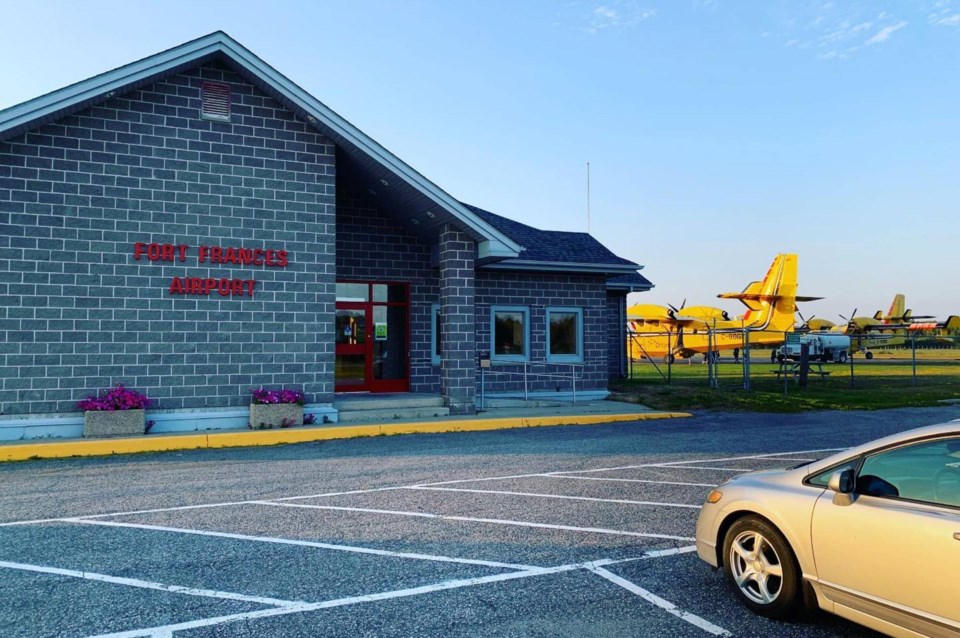Fort Frances Airport reports increasing fuel sales for air travel in northern Ontario, comparing this year’s fuel sales to both pre-pandemic times and during the pandemic, when border restrictions limited travel but forest fires that needed to be serviced resulted in one of the busiest fire seasons the airport had ever seen.
“2019 was normal. 2020 was absolutely dead. And then 2021 hit, and we had a fire season here. And it was absolutely crazy. Like beyond crazy, but it was only fire people giving us all the movements and helicopters and tons of fuel, but there was still no international traffic. And Bearskin [airlines], I don’t even know if they’re even up and running the majority of the time,” said Scott Gosman, one employee at the Fort Frances Airport. “If it wasn’t for the fire, there wouldn’t have been any sales.”
This year, between January and September, Fort Frances Airport has sold 149,529 litres of fuel, mostly to private jets and planes from the U.S. or eastern Canadian cities such as Toronto and Montreal — an 11 per cent increase compared to 2019, according to Fort Frances Airport.
Year to date, 223 international flights have arrived to Fort Frances Airport — a 6.7 per cent increase from 2019. There have been 286 arriving flights for private movements — a 72 per cent increase from 2019.
Gosman noted that emergency border measures had only eased up in April allowing for fully vaccinated travellers to no longer be required to provide a quarantine plan upon entry, meaning that the increase in travel is even greater, considering that most of the travel was likely in the short five month period between April and September.
He speculates that this year’s increased fuel sales is a result of border restrictions being lifted and people going on trips that were postponed because of the pandemic.
During last year’s forest fires, the airport was pumping over 8000 litres of fuel a day to cater to fire crews, helicopters, and other vehicles servicing the fire. Not including the fuel used to service the fire, a total of 103,000 litres was sold in 2021 — making a 45 per cent increase compared to this year, according to Fort Frances Airport.
“But this year was pretty good, there’s no fire and we’re still up. We sold more fuel now than we did all of last year with the fire. And that’s just from regular movements,” Gosman said.
“It’s weird too that it was so dry [last year]. And then this year, it was just a flood. Fires endemic, then fires to flood. Let’s see what next year brings.”
As of October 1, 2022, the government of Canada announced that all emergency border measures have ended.
Travellers entering the country by air, land or marine no longer require proof of vaccination, COVID-19 pre-entry and arrival tests, nor quarantine or isolation. Masks on planes and trains are no longer mandatory, although travellers are still strongly recommended to wear them.
To save time, an optional Advance Declaration feature in ArriveCAN allows travellers to submit their customs and immigration declaration before arriving in Canada, however travellers are no longer required to submit public health information such as proof of vaccination and arrival tests. This feature is available at Toronto Pearson, Vancouver, or Montreal-Trudeau international airports, but will soon be available at more airports within the coming months.
Individuals are still recommended to keep up with recommended vaccinations and personal protective habits such as hand washing and staying home if COVID-19 symptoms are present.
“There is still the possibility of a future resurgence in cases this fall or of a new variant of concern. …These protective health measures help to reduce the risk of becoming sick and spreading illness to others,” the government of Canada said.
Multiple factors have contributed to the reduced impacts of COVID-19 in Canada, such as increasing immunity within the population, lower hospitalization and death rates, high vaccination rates, and rapid tests and treatments.
Fort Frances Times, Local Journalism Initiative Reporter
